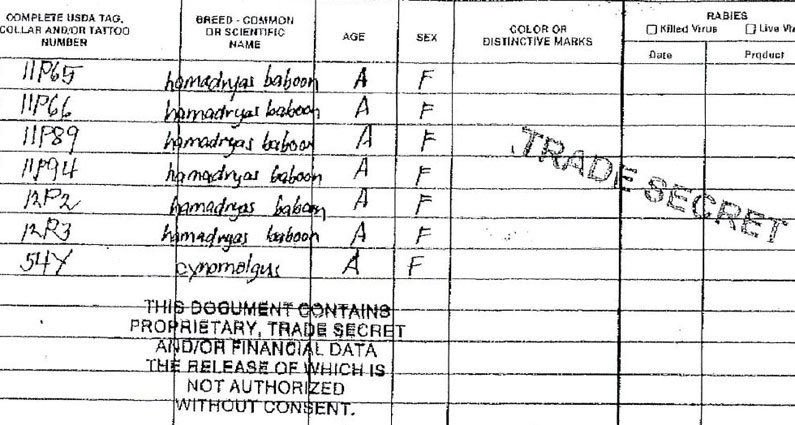Animal protection groups condemn as cruel and inhumane research carried out at US Army Medical Research Institute in which monkeys were infected with Marburg virus
Action for Primates and Animal Rights Foundation of Florida have criticised an experiment, recently published in The Journal of Infectious Diseases, which was carried out to study the effectiveness of remdesivir in macaques deliberately infected with Marburg virus, some of whom were left untreated. Remdesivir is an antiviral drug developed by Gilead Sciences, and, according to a conflict of interest statement, five of the authors of the paper were current or former employees and may be shareholders in the company. The remaining authors were from the United States Army Medical Research Institute of Infectious Diseases (USAMRIID) and The Geneva Foundation. The research was funded by taxpayers’ money.
Marburg virus causes a highly virulent disease which results in haemorrhagic fever, with a fatality rate of up to 88% in people. The Marburg virus is classified as a Category A biowarfare agent by the Centers for Disease Control and Prevention (CDC) and there are no vaccines or effective therapies currently available.
In the experiment, 24 long-tailed macaques supplied by Worldwide Primates, Florida, were deliberately injected with the Marburg virus and kept in a biosafety level 4 (BSL-4) laboratory at USAMRIID, Frederick, MD. Eighteen of the monkeys were given different doses of the test treatment (remdesivir) starting 4-5 days after the virus injection. The remaining six individuals, who were ‘control’ animals, received no treatment. Blood was taken from each animal via a leg vein on days 0, 3, 4, 5, 6, 7, 8, 10, 14, 21, 28, 35, and 41 post-inoculation. When blood was taken, the monkeys were given ketamine.
According to the published research, all the ‘control’ monkeys developed acute signs characteristic of Marburg virus disease infection, such as fever and rash, behavioral depression and deteriorating physical responsiveness. They were either allowed to die or were killed 7 and 9 days after infection because of the severity of their suffering. Many of the monkeys who had received treatment also became ill (although they had an “increased survival” rate) and died or had to be killed. All monkeys who were still alive at the end of the observation period were killed for further study. The post-mortems carried out showed that some of the animals had incurred major organ damage as a result of the virus.
According to the CDC, the onset of symptoms for Marburg virus disease in people is sudden and includes fever, chills and muscle pain, followed by nausea, vomiting and diarrhea. The illness becomes increasingly severe and can include substantial weight loss, massive hemorrhaging, shock, liver failure, and multiple organ dysfunction. Given that the Marburg virus infection in the monkeys in this experiment was stated to have caused disease similar to that in people, we have to assume that at least some of these gruesome and highly painful conditions described by the CDC were present in the monkeys.
Dr Nedim Buyukmihci, Emeritus Professor of Veterinary Medicine, UC Davis California and representative of Action for Primates, who has reviewed the publication, stated: “There is no doubt that these macaques suffered horrendously during this experiment. Unfortunately, this is not an isolated situation and many thousands of other non-human primates are caused to suffer greatly as a result of the search for treatment and vaccines against viruses such as Marburg, Ebola and, most recently, the coronavirus responsible for Covid-19. Although the search for treatment or vaccines against such viruses is crucial to reducing suffering and death in people, we should not be causing equal or greater suffering in others such as non-human primates. Aside from the moral implications of using non-human primates in this way, there is also the sound scientific argument that animal research cannot be relied upon to produce safe and effective treatments for people. As moral and intelligent beings, we need to employ research methods that are humane and effective without intentionally causing suffering and death in others.”
Nick Atwood, Animal Rights Foundation of Florida, said: “We are saddened by the Florida connection to this experiment that resulted in the horrible suffering and death of many monkeys. The use of monkeys in the search for a Marburg virus or COVID-19 vaccine is not only cruel, but is unnecessary and often produces misleading results. We need to focus instead on human-based research methods.”
Remdesivir was originally developed as a treatment in people for Ebola and Marburg infections, but did not demonstrate clinical efficacy. Research with remdesivir has since been revived with the outbreak of Covid-19.
# # #



